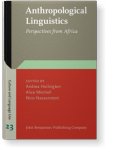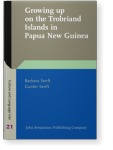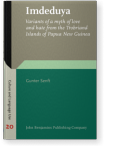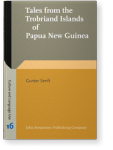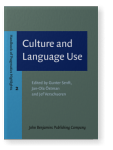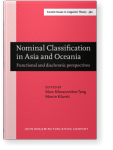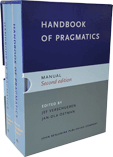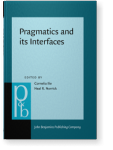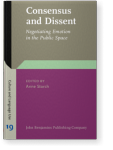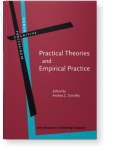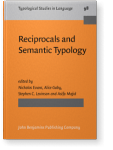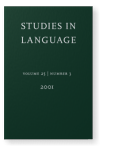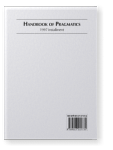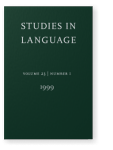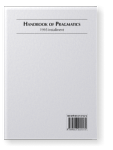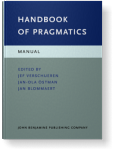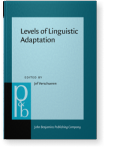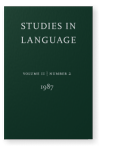Gunter Senft
List of John Benjamins publications for which Gunter Senft plays a role.
Book series
Growing up on the Trobriand Islands in Papua New Guinea: Childhood and educational ideologies in Tauwema
Barbara Senft and Gunter Senft
[Culture and Language Use, 21] 2018. xxv, 248 pp.
Subjects Anthropological Linguistics | Austronesian languages | Sociology
Imdeduya: Variants of a myth of love and hate from the Trobriand Islands of Papua New Guinea
Gunter Senft
[Culture and Language Use, 20] 2017. xvi, 244 pp.
Subjects Anthropological Linguistics | Austronesian languages | Narrative Studies
Tales from the Trobriand Islands of Papua New Guinea: Psycholinguistic and anthropological linguistic analyses of tales told by Trobriand children and adults
Gunter Senft
[Culture and Language Use, 16] 2015. xviii, 299 pp.
Subjects Anthropological Linguistics | Austronesian languages | Cognition and language | Psycholinguistics
The Tuma Underworld of Love: Erotic and other narrative songs of the Trobriand Islanders and their spirits of the dead
Gunter Senft
[Culture and Language Use, 5] 2011. xvii, 138 pp.
Subjects Anthropological Linguistics | Austronesian languages
Culture and Language Use
Edited by Gunter Senft, Jan-Ola Östman and Jef Verschueren
[Handbook of Pragmatics Highlights, 2] 2009. xiii, 280 pp.
Subjects Discourse studies | Pragmatics
2023 Chapter 2. The system of classifiers in Kilivila: The role of these formatives and their functions Nominal Classification in Asia and Oceania: Functional and diachronic perspectives, Allassonnière-Tang, Marc and Marcin Kilarski (eds.), pp. 10–29 | Chapter
This paper presents the complex system of classifiers in Kilivila, the language of the Trobriand Islanders of Papua New Guinea. After a brief introduction to the language and its speakers, the classifier system is briefly described with respect to the role of these formatives for the word… read more
2022 Fieldwork Handbook of Pragmatics: Manual, Verschueren, Jef and Jan-Ola Östman (eds.), pp. 1618–1624 | Chapter
2022 Elicitation Handbook of Pragmatics: Manual, Verschueren, Jef and Jan-Ola Östman (eds.), pp. 1539–1542 | Chapter
2018 Pragmatics and anthropology: The Trobriand Islanders’ ways of speaking Pragmatics and its Interfaces, Ilie, Cornelia and Neal R. Norrick (eds.), pp. 185–211 | Chapter
Bronislaw Malinowski – based on his experience during his field research on the Trobriand Islands – pointed out that language is first and foremost a tool for creating social bonds. It is a mode of behavior and the meaning of an utterance is constituted by its pragmatic function. Malinowski’s… read more
2017 Chapter 4. “Control your emotions! If teasing provokes you, you’ve lost your face…”: The Trobriand Islanders’ control of their public display of emotions Consensus and Dissent: Negotiating Emotion in the Public Space, Storch, Anne (ed.), pp. 59–80 | Chapter
Kilivila, the Austronesian language of the Trobriand Islanders of Papua New Guinea, has a rich inventory of terms – nouns, verbs, adjectives and idiomatic phrases and expressions – to precisely refer to, and to differentiate emotions and inner feelings. This paper describes how the Trobriand… read more
2012 Referring to colour and taste in Kilivila: Stability and change in two lexical domains of sensory perception Practical Theories and Empirical Practice: A linguistic perspective, Schalley, Andrea C. (ed.), pp. 71–98 | Article
This chapter first compares data collected on Kilivila colour terms in 1983 with data collected in 2008. The Kilivila lexicon has changed from a typical stage IIIb into a stage VII colour term lexicon (Berlin & Kay 1969). The chapter then compares data on the Kilivila taste vocabulary collected in… read more
2011 13. To have and have not: Kilivila reciprocals Reciprocals and Semantic Typology, Evans, Nicholas, Alice Gaby, Stephen C. Levinson and Asifa Majid (eds.), pp. 225–232 | Article
Kilivila is one of the languages of the world that lacks dedicated reciprocal forms. After a short introduction the paper briefly shows how reciprocity is either not expressed at all, is only implicated in an utterance, or expressed periphrastically.
read more2009 Bronislaw Kasper Malinowski Culture and Language Use, Senft, Gunter, Jan-Ola Östman and Jef Verschueren (eds.), pp. 210–225 | Article
2009 Elicitation Culture and Language Use, Senft, Gunter, Jan-Ola Östman and Jef Verschueren (eds.), pp. 105–109 | Article
2009 Phatic communion Culture and Language Use, Senft, Gunter, Jan-Ola Östman and Jef Verschueren (eds.), pp. 226–233 | Article
2009 Introduction Culture and Language Use, Senft, Gunter, Jan-Ola Östman and Jef Verschueren (eds.), pp. 1–17 | Article
2009 Fieldwork Culture and Language Use, Senft, Gunter, Jan-Ola Östman and Jef Verschueren (eds.), pp. 131–139 | Article
2001 Frames of spatial reference in Kilivila Studies in Language 25:3, pp. 521–555 | Article
Members of the MPI for Psycholinguistics are researching the interrelationship between language, cognition and the conceptualization of space in various languages. Research results show that there are three frames of spatial reference, the absolute, the relative, and the intrinsic frame of… read more
1999 Bronislaw Kasper Malinowski Handbook of Pragmatics: 1997 Installment, Verschueren, Jef, Jan-Ola Östman, Jan Blommaert † and Chris Bulcaen (eds.), pp. 1–20 | Article
1999 Enter and Exit in Kilivila Studies in Language 23:1, pp. 1–23 | Article
Based on film animation scenes and on an elicitation-task devised by members of the Cognitive Anthropology Research Group I elicited data on how the concepts ENTER and EXIT are expressed in Kilivila, the Austronesian language of the Trobriand Islanders. The paper presents the methodology used for… read more
1996 Phatic communion Handbook of Pragmatics: 1995 Installment, Verschueren, Jef, Jan-Ola Östman, Jan Blommaert † and Chris Bulcaen (eds.), pp. 1–10 | Article
1995 Elicitation Handbook of Pragmatics: Manual, Verschueren, Jef, Jan-Ola Östman and Jan Blommaert † (eds.), pp. 577–581 | Article
1995 Fieldwork Handbook of Pragmatics: Manual, Verschueren, Jef, Jan-Ola Östman and Jan Blommaert † (eds.), pp. 595–601 | Article
1991 Prolegomena to the pragmatics of “situational-intentional” varieties in Kilivila language Levels of Linguistic Adaptation: Selected papers from the International Pragmatics Conference, Antwerp, August 1987, Verschueren, Jef (ed.), pp. 235–248 | Article
1987 Kilivila Color Terms Studies in Language 11:2, pp. 313–346 | Article
This paper documents the results of a study of color terms produced by Trobriand Islanders. Eleven color stimuli were presented to 60 informants in five different age-groups ranging from approximately 4 to 75 years. These informants, native speakers of Kilivila, live in Tauwema village on Kaileuna… read more
